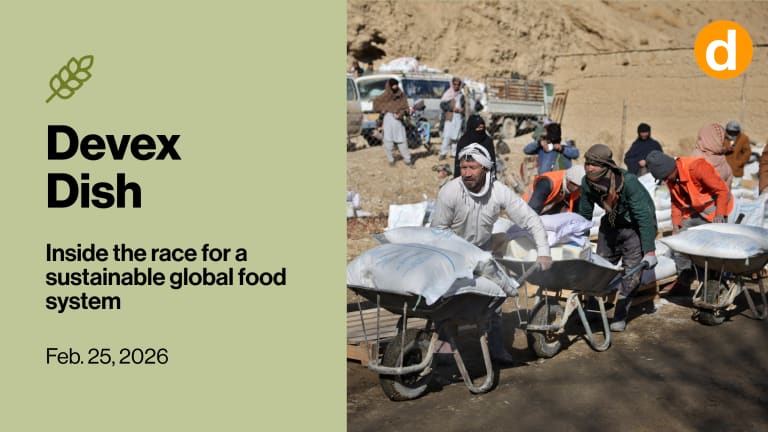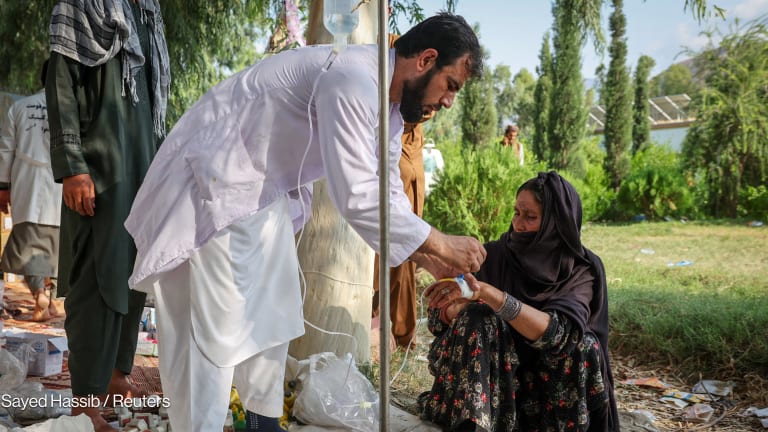USAID maintaining 'readiness' in Afghanistan, but unclear for what

For nearly two decades, the U.S. Agency for International Development’s Afghanistan mission was one of its largest in the world. In 2019, USAID spent nearly $1 billion in the country, with much of it funding programs related to democratic governance, human rights, and economic development.
Now, in the wake of U.S. military withdrawal and the Taliban’s rapid seizure of power, USAID finds itself in a much more limited — and uncertain — role.
With development assistance sidelined by sanctions and security challenges, USAID has been forced to support other organizations’ lifesaving humanitarian programs from outside the country. And for the time being, questions about what a longer-term development strategy in Taliban-controlled Afghanistan could entail go unanswered.
In their recent communication with implementing partners, USAID officials have stated that the agency’s engagement with Afghanistan will look different post-withdrawal.
Aid groups shift to emergency response as US leaves Afghanistan
Aid groups are seeing an influx of displaced people to Kabul, as they warn that humanitarian needs in Afghanistan are growing amid the collapse of the government and the Taliban takeover.
“The rapid decline of the security situation will result in changes to the future and direction of USAID programs in Afghanistan,” Mark Walther, director of USAID’s office of acquisition and assistance, wrote in a Sept. 7 letter to organizations working in Afghanistan, which Devex obtained.
“While USAID evaluates its plans for programming in Afghanistan, it is imperative that readiness is maintained, and most importantly that we provide for the safety and security of staff,” he wrote.
To do so, USAID authorized its Afghanistan implementing partners to continue paying staff salaries and encouraged them to work remotely “to the maximum extent possible.”
The same letter authorized contractors working in Afghanistan to delay the submission of financial, performance, and other reports for up to three months.
USAID officials have repeatedly stressed that many of the agency’s humanitarian partners, including United Nations agencies and NGOs, remain in the country despite the withdrawal of U.S. military troops and the Taliban’s takeover.
“Most of USAID's humanitarian partners remain operational and are working to ensure safe continuation of life-saving programs across Afghanistan as the security situation permits,” the spokesperson wrote.
“There does seem to be a clash of worldviews here, in that Biden has clearly grown more skeptical of the value of humanitarian and military interventions and wants to take a more pragmatic approach than what Ambassador Power [has advocated].”
— anonymous U.S. development expertIn late August, USAID activated a Disaster Assistance Response Team to lead the U.S. government’s humanitarian response to the crisis in Afghanistan. The DART — a specialized unit of disaster response and logistics specialists deployed to complex crises and natural disasters — will operate outside of Afghanistan, though the agency has not specified where.
“This team will not be going into Afghanistan,” a USAID spokesperson wrote to Devex. “Consistent with [U.S. government] sanctions on the Taliban, the aid will flow through independent organizations, such as UN agencies and NGOs. No one, including the Taliban, should impede these efforts.”
The spokesperson did not address a question from Devex about the agency’s process for determining a longer-term development engagement strategy and the factors influencing what that strategy will look like.
Instead, responses focused solely on humanitarian assistance — such as food, health care, medical supplies, protection, hygiene supplies, and support to help communities prepare for winter — and the agency’s efforts to ensure that personal remittances “can get through to the Afghan people.”
Looking for answers
U.S. lawmakers have also sought information from the White House about its plans for development engagement in Afghanistan now that the two-decade reconstruction effort — which saw foreign aid linked with military objectives — has come to a sudden and dramatic end.
On Sept. 10, Texas Rep. Michael McCaul, the top Republican on the House Foreign Affairs Committee, sent a letter to USAID Administrator Samantha Power with a list of 19 questions about USAID’s role in the evacuation process, and about the future of its programming in Afghanistan.
“Please provide a full list of the benchmarks and conditions under which the Administration would consider the resumption of economic and development assistance in Afghanistan,” one question reads.
“Please explain whether and how U.S foreign assistance programs will be executed in a Taliban-controlled Afghanistan and what steps are being taken to mitigate diversion, security threats to partners, and waste, fraud, and abuse,” asks another.
McCaul requested that Power respond to his questions by Sept. 20, and said he hopes she will testify before the committee in the coming weeks. McCaul’s office did not share whether they have received any answers yet.
In the letter, McCaul also cited “previous public positions you personally have taken,” presumably referring to Power’s history of advocating for humanitarian intervention to prevent genocide and human rights abuses.
As US pulls out of Afghanistan, development must adjust, experts say
The rapidly devolving security situation in Afghanistan is creating new obstacles for development organizations. Experts say the Afghan government needs support and new projects must be sustainable.
While President Joe Biden elevated Power’s position of administrator to a seat on the National Security Council, whether she was deeply involved in the policy planning around U.S. military withdrawal in Afghanistan, USAID’s contingency planning, and the evacuation itself is not clear.
On Aug. 14, one day before the Taliban seized Kabul and the government of Afghanistan collapsed, Biden designated Power as the senior U.S. official to coordinate the response to the earthquake in Haiti.
Power, who regularly shares her views on social media about geopolitical and human rights issues, said little about Afghanistan as its political and humanitarian crisis worsened.
“There does seem to be a clash of worldviews here, in that Biden has clearly grown more skeptical of the value of humanitarian and military interventions and wants to take a more pragmatic approach than what Ambassador Power [has advocated],” a U.S. development expert who spoke on the condition of anonymity told Devex.
“How this plays out in the coming years will tell us a lot about whether their views are incompatible,” the expert added.
A current USAID official who was not authorized to speak to the press told Devex that Power may be “playing her cards close to her chest” and “trying to keep a low-profile” on the issue in recognition of how much anger there is inside the agency over how unprepared it was for this “highly likely eventuality.”
“Which is too bad,” the official added. “Many of us want accountability for this failure.”
Search for articles
Most Read
- 1
- 2
- 3
- 4
- 5








